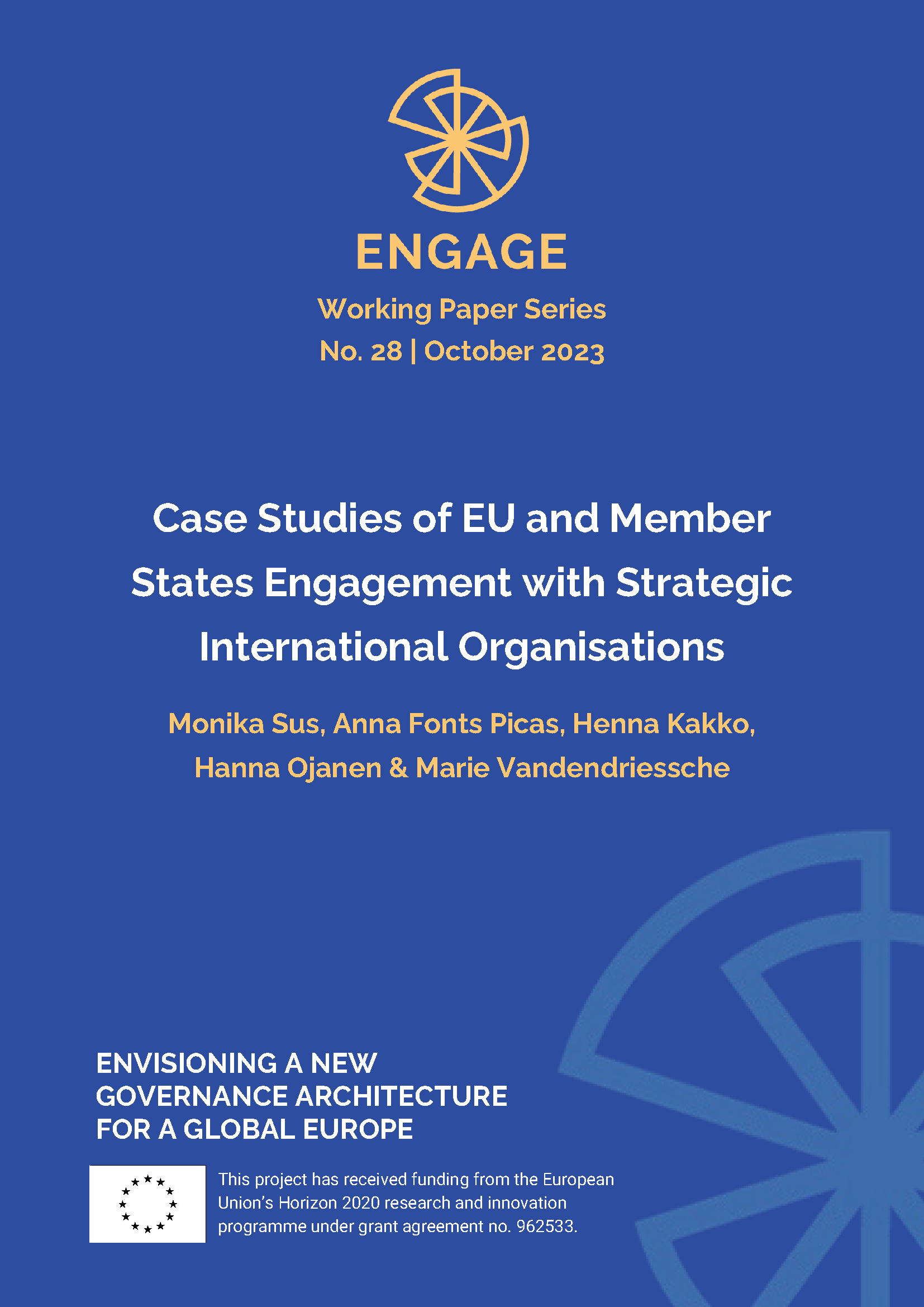
Publications

10 Recommendations to Make the European Union a Stronger Global Actor
The following ten recommendations would help the EU become a stronger global actor capable of effectively addressing current and future geopolitical challenges. The first four concern the institutional framework of EU foreign and security policy, while the next six tackle individual policy areas. Taken together, they represent a comprehensive plan for improving the way the EU operates on the international stage.

Harnessing the EU’s Comparative Advantages in Conflict Management
This policy brief examines how the EU can leverage its unique strengths to become more proactive, assertive, and effective on the international stage. It offers several recommendations to achieve this goal, including leveraging the expertise of EU agencies for external action, empowering and expanding the corps of EU Special Representatives (EUSRs) and intensifying support for civil society engagement. These measures aim to enhance the EU's role in conflict prevention, mediation, and resolution, while also promoting gender mainstreaming, economic development and environmental protection.

Enhancing the EU’s Strategic Partnerships
This policy brief examines the European Union's strategic partnerships as a foreign policy tool in today's complex global landscape and questions their effectiveness, coherence, and sustainability. The pertinence of the these strategic partnership and their strategic value have become increasingly ambiguous. To address these challenges, we propose several steps for the EU to consider. Firstly, a comprehensive review of existing partnerships is necessary, including streamlining successful ones and terminating those no longer feasible. This effort should be led by the European Commission and the European External Action Service, with input from other institutions. Secondly, prioritizing partnerships with like-minded democratic states and international organizations such as the United States, the United Kingdom, and the G7 countries can ensure long-term synergies and shared interests. Lastly, harmonizing the EU's strategic objectives with those of its Member States requires improved communication and coordination, particularly in multilateral settings.

Forging a Credible Enlargement Policy
This policy brief highlights the inadequacies of the EU's accession policy in the aftermath of Russia's invasion of Ukraine. It argues that the disconnection between the enlargement policy and geopolitical realities leaves Eastern European states in a precarious situation. The brief suggests essential recommendations, including reducing the Council's role, adopting qualified majority voting, setting target admission dates, and emphasizing a merit-based accession process, without necessitating Treaty changes.

Proposals to Improve the EU’s Engagement in Conflict Resolution, Prevention and Mediation
This working paper provides policy recommendations for enhancing the European Union and its Member States' engagement in conflict resolution, prevention, and mediation, aiming for greater effectiveness, coherence, and sustainability. It emphasizes the need for coherence and synergies between community-based policies and intergovernmental CFSP and CSDP instruments. Key insights include the importance of foresight, addressing nexus issues like environment, development, and gender, and considering external factors and major powers' roles in crisis situations. The paper identifies four clusters of challenges, offering recommendations to address fragmented discourse, improve coordination, leverage comparative advantages, and proactively respond to geopolitical shifts. The document concludes by proposing assessment criteria for evaluating EU engagement in conflict management.

Formulating Proposals for a More Effective Engagement with Neighbourhood Regions
This working paper, stemming from ENGAGE Work Package 8, explores the EU's engagement with neighboring countries within the European Neighbourhood Policy (ENP). Despite the ENP's technocratic approach since its launch in 2003, its separate standing from the EU's Common Foreign and Security Policy has hindered its effectiveness. A lack of consensus among Member States on ENP goals, especially in security matters, and the EU's failure to evolve into a robust security actor have led to disillusionment. The paper suggests the EU must align actions with its narrative or reconsider geopolitical ambitions to bridge this gap.

Assessing the European Union's External Action Towards Its Strategic Partners and Formulating Policy Recommendations
This working paper examines the effectiveness of the EU’s strategic partnerships as a foreign policy tool aimed at promoting a multilateral, rules-based world order. It assesses the EU’s engagement with partners against the backdrop of mounting global rivalries and instability, including Russia’s invasion of Ukraine and the Israel-Hamas war. The paper underscores the evolving nature of the EU’s strategic partnerships and, in light of today’s challenges, calls for/recommends a review of existing agreements and the harmonization of Member State and EU positions.

The EU’s Approach to Nexus Issues in Conflict Prevention, Mediation and Resolution: Climate, Development and Gender
This working paper assesses the European Union's strategies in addressing conflict prevention, mediation and resolution in Guatemala, Serbia, and the Arctic. In Guatemala, the EU emphasizes integrating gender perspectives into peacebuilding efforts but encounters uncertainties in applying these principles to indigenous and rural communities. In Serbia, EU funding for aligned development projects faces hurdles due to Serbia's financial limitations and administrative capacity. As for the Arctic, the EU grapples with environmental fragility and geopolitical complexities while demonstrating a commitment to bolstering its presence despite historical disputes.

Case Study Analysis of Conflicts and Crises in the EU’s Neighbourhoods
This paper examines the EU's selective crisis engagement in its neighborhood. Analyzing the Israel-Palestine and Armenia-Azerbaijan protracted conflicts, and the more recent and cascading (crisis-to-war) conflicts in Libya and Ukraine, it uncovers patterns driven by proximity, severity, and salience. While noting challenges, the paper finds a positive exception in Ukraine's case, signaling a potential shift in the EU's crisis response dynamics, especially in the context of Russia's escalating war.

Case Studies of EU and Member State Engagement with Strategic International Organisations
This working paper assesses the European Union's ability to implement integrated external action in conflict resolution, prevention, and mediation through three case studies of its strategic partnerships with international organizations in addressing crises. It examines the EU's effectiveness and its capacity to act coherently and autonomously in these scenarios, shedding light on the dynamic nature of such partnerships and the importance of adaptability for successful cooperation.

Coordinating External Action Beyond Crisis
This policy brief advances recommendations to creatively coordinate existing tools, instruments and resources across multiple policy areas to bolster the EU’s external action. For greater effectiveness, it suggests better coordination within EU delegations, smoother policy mainstreaming and the leveraging of the Team Europe approach in both crisis and non-crisis situations.

Making Faster and Better Decisions in EU Common Foreign and Security Policy
This policy brief puts forward four recommendations to improve the EU's Common Foreign and Security Policy's efficiency, allowing the union to become a more assertive global actor. Compiling pre-existent ENGAGE research, it offers three different avenues for policymakers to efficiently advance CFSP objectives through qualified majority voting.

Case Studies of the EU’s Actions in the Field of Conflict Resolution, Prevention and Mediation
This paper assesses the European Union's ability to implement integrated external action in conflict prevention, mediation and resolution. By examining EU involvement in four different crisis theatres, it evaluates the EU's performance in terms of perceptions by other parties and its capacity to act coherently and autonomously.

Mapping Changing Intra-EU and External Opportunity Structures and Their Impact on Past EU Neighbourhood Policies
This paper provides a comprehensive, detailed and systematic mapping of the changing intra-EU and external opportunity structures since the launch of the European Neighbourhood Policy. It argues that the complex and shifting regional dynamics expose the inherent limits of the undifferentiated, uniform institutional design of the neighbourhood policy.

Case Studies of EU and Member States’ Engagement with Global Strategic Partner Countries
This working paper delivers a comprehensive examination of the European Union's strategic partnerships with Brazil, the United Kingdom, the United States, Russia and Turkey. By zooming in on critical policy areas of each relationship and the role of EU Member States therein, the paper sheds light on the horizontal and vertical coherence of the EU’s external action.

Prepare for the Fight of the Future
Decades of underinvestment and uncoordinated military capability development have hollowed out Europe’s armed forces. With war having returned to Europe, EU Member States must boost their own security and better coordinate their efforts. This brief puts forward recommendations to improve cooperation in capability development and reduce European fragmentation and inefficiencies.

Assessing the Current Structures and Processes of External Action Plus and Formulating Recommendations
The European Union's "external action plus" is an assortment of policy areas with varying legal competences that may be linked and interact in ways that enable more effective, coherent and sustainable external action. This paper explores the policy linkages and how they can best be coordinated in support of EU external engagement in crisis as well as non-crisis situations.

Assessing Current CFSP Structures and Processes and Formulating Recommendations
The rules and procedures of the EU's Common Foreign and Security Policy often seem to stand in the way of effective external action. Alongside a more general reform of decision-making processes, this paper recommends a gradual shift to Qualified Majority Voting and a further investment into improved intelligence sharing.

Assessing Current CSDP Structures and Processes and Formulating Recommendations
What are the strengths and weaknesses of the EU’s Common Security and Defence Policy, specifically with regard to its legal basis, governance structures, operational deployments and capability development. To make defence cooperation among Member States more effective, coherent and sustainable, this working paper advances a set of recommendations.

Case Studies of Traditionally Internal Policy Areas with Outward Effects: Competition, Climate Change and Health
The EU’s external action also includes internal policies with external dimensions. Harnessing these non-traditional foreign policy tools can help the EU become a stronger global actor. In order to identify how the EU can meet its strategic challenges more holistically, effectively and sustainably, this paper studies the cases of competition, climate change as well as health and examines their linkages to other, more traditional external action policies.

